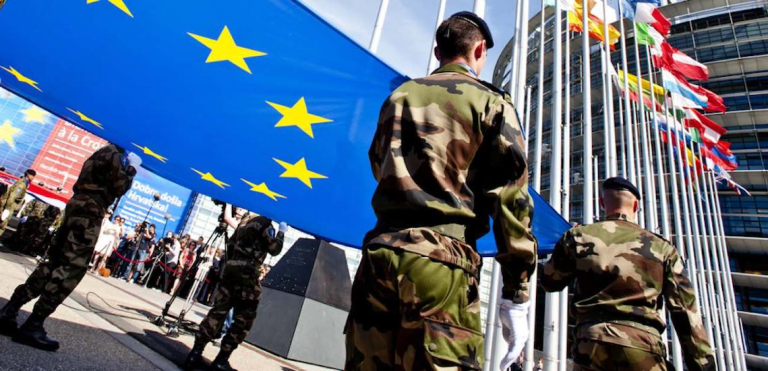
Talks Signal Shift in European Defense Strategy
Brussels – European leaders are intensifying discussions about establishing a unified European Union army, a proposal that could reshape the continent’s defense landscape. The idea, long debated, has gained traction amid geopolitical tensions, including the ongoing Russia–Ukraine conflict and uncertainties surrounding U.S. commitments to NATO. While proponents argue it would enhance EU autonomy, critics warn of logistical challenges and potential fractures in transatlantic alliances.
Rising Geopolitical Pressures Fuel Debate
The push for an EU army stems from a desire for strategic independence. Recent events, such as Russia’s actions in Ukraine and fluctuating U.S. foreign policy, have prompted EU leaders to reconsider reliance on NATO. French President Emmanuel Macron, a vocal advocate, has called for a “true European army” to protect the bloc from external threats. Germany and other member states have expressed cautious support, emphasizing the need for coordinated defense policies.
However, the proposal faces hurdles. The EU comprises 27 nations with diverse military capabilities and political priorities. Aligning these interests into a cohesive force remains a significant challenge. Additionally, some leaders, particularly in Eastern Europe, fear that an EU army could undermine NATO, which has been the cornerstone of European security since 1949.
Historical Context of EU Defense Efforts
The concept of a unified EU military is not new. The European Defense Community, proposed in the 1950s, aimed to create a supranational army but collapsed due to political resistance. More recently, initiatives like the Permanent Structured Cooperation (PESCO) have fostered defense collaboration among EU states, though they fall short of a standing army. These efforts reflect a long-standing tension between national sovereignty and collective security.
Current talks build on these foundations. The EU’s Strategic Compass, adopted in 2022, outlined plans for a rapid deployment force of up to 5,000 troops by 2025. While this is a step toward integration, advocates argue that a fully unified army would require a centralized command structure and shared funding, raising questions about feasibility.
Logistical and Political Challenges
Creating an EU army involves complex logistical considerations. Member states maintain separate militaries with varying equipment, training standards, and languages. Harmonizing these into a single force would demand significant investment and time. Budget constraints, already strained by economic recovery efforts, could further complicate funding.
Politically, the proposal risks exacerbating divisions within the EU. Countries like Poland and the Baltic states, which prioritize NATO due to their proximity to Russia, are skeptical of diverting resources. Neutral nations, such as Ireland and Austria, may resist deeper military integration, citing their non-aligned traditions. Balancing these perspectives will test the EU’s unity.
Global Implications of an EU Army
If realized, an EU army could alter global power dynamics. A stronger EU defense capability might reduce dependence on the U.S., potentially reshaping transatlantic relations. It could also influence China’s perception of the EU as a geopolitical player, particularly in the Indo-Pacific region. However, experts caution that an EU army must complement, not compete with, NATO to maintain allied cohesion.
The discussion also raises questions about the EU’s role in global conflicts. A unified army could enable the bloc to respond more decisively to crises, such as those in the Sahel or the Middle East. Yet, defining the army’s mandate—whether for defense, peacekeeping, or intervention—remains contentious.
Path Forward and Next Steps
EU leaders have pledged to continue consultations, with upcoming summits expected to clarify the proposal’s scope. Technical working groups are exploring integration models, drawing on existing frameworks like PESCO. Public opinion, which varies across member states, will also shape the debate. Surveys indicate strong support in France and Germany, but skepticism persists in Nordic and Eastern European countries.
For now, the EU is focusing on incremental steps, such as joint procurement and enhanced military mobility. Whether these efforts culminate in a standing army depends on political will and external pressures.
U.S. Instability: E.U. Leaders Debate Forming Unified Army (May 6, 2025)
#EUArmy #EuropeanDefense #Geopolitics
Tags: EU, NATO, defense, geopolitics, Europe

Share your thoughts on a unified EU army.
How should Europe balance autonomy and alliances?
Join the conversation online.
Social Media Blurbs:
X Blurb
EU Leaders Debate Forming Unified Army. European leaders discuss an EU army to boost autonomy. #EUArmy #Geopolitics Read more: bit.ly/EUArmyStory
Bluesky Blurb
EU Leaders Debate Forming Unified Army. Talks on an EU army gain momentum as leaders seek strategic independence. What’s next? #EUArmy #EuropeanDefense bit.ly/EUArmyStory
LinkedIn Blurb
EU Leaders Debate Forming Unified Army. European leaders are exploring a unified EU army to enhance strategic autonomy amid shifting global alliances. This could reshape defense industries, geopolitics, and transatlantic ties. How will businesses adapt to potential changes in European security? Read more: https://www.stewardshipreport.org/eu-army-proposal #EUArmy #Geopolitics #DefenseIndustry
Truth Social Blurb
EU Leaders Debate Forming Unified Army. European leaders push for an EU army to strengthen defense. Challenges remain. #EUArmy https://www.stewardshipreport.org/eu-army-proposal
Mastodon Blurb
European leaders are discussing a unified EU army to enhance autonomy amid global tensions. Can the EU align 27 nations for a cohesive defense force? EU Leaders Debate Forming Unified Army. Join the conversation! #EUArmy #Geopolitics https://www.stewardshipreport.org/eu-army-proposal
Instagram Blurb
EU Leaders Debate Forming Unified Army. Could a unified EU army reshape global defense? Share your thoughts!
#EUArmy #EuropeanDefense #Geopolitics #GlobalSecurity
Link in bio: bit.ly/EUArmyStory
Facebook Blurb
EU Leaders Debate Forming Unified Army. European leaders are exploring a unified EU army to boost strategic autonomy amid geopolitical shifts. Could this change global alliances? Read more about the challenges and implications. #EUArmy #Geopolitics #EuropeanDefense https://www.stewardshipreport.org/eu-army-proposal
Reddit Blurb
EU Leaders Debate Forming Unified Army. European leaders are discussing a unified EU army to enhance autonomy, but logistical and political hurdles loom. Could this reshape NATO ties? What are the biggest challenges to creating an EU army, and how might it impact global security? #EUArmy #Geopolitics https://www.stewardshipreport.org/eu-army-proposal